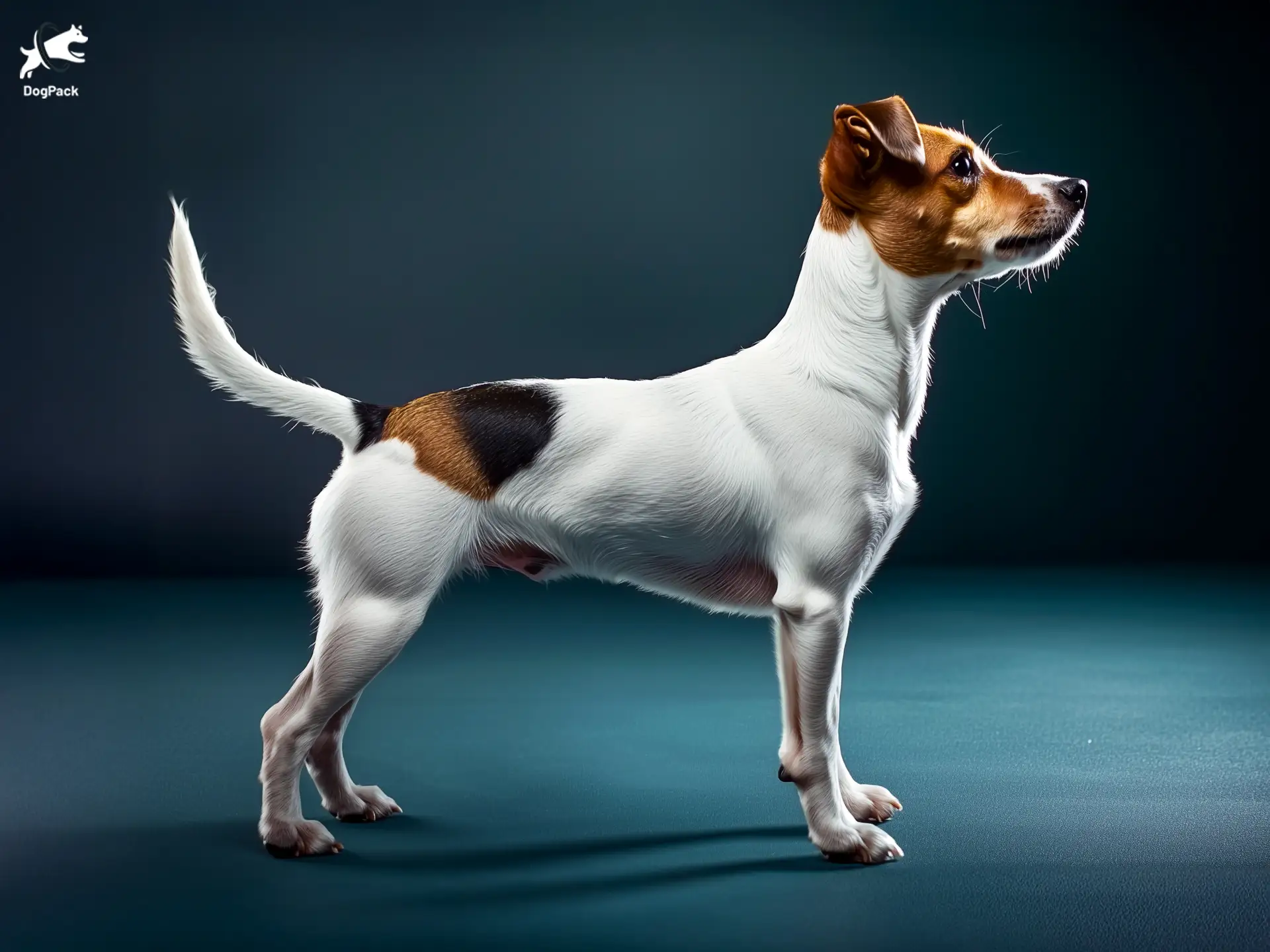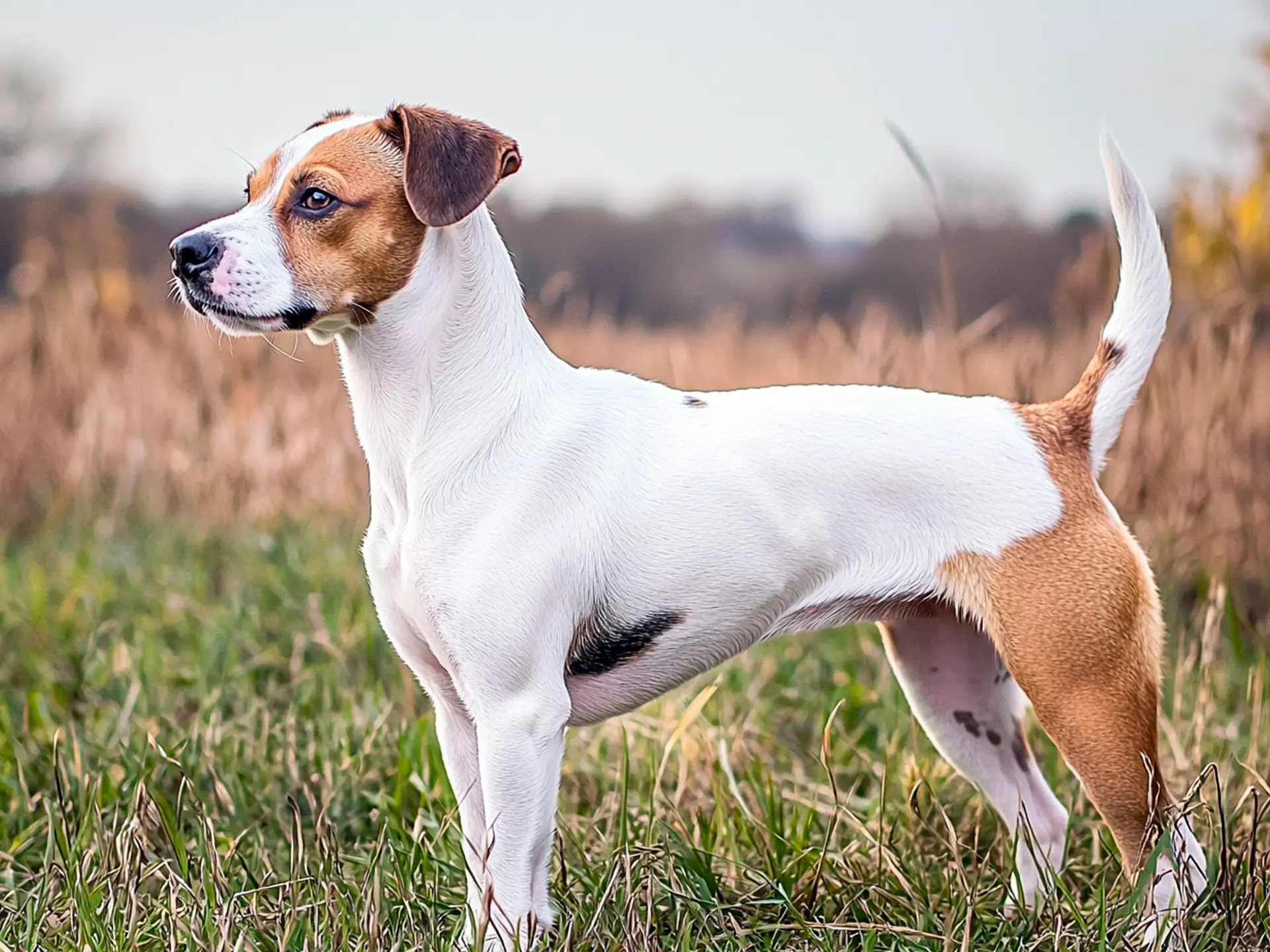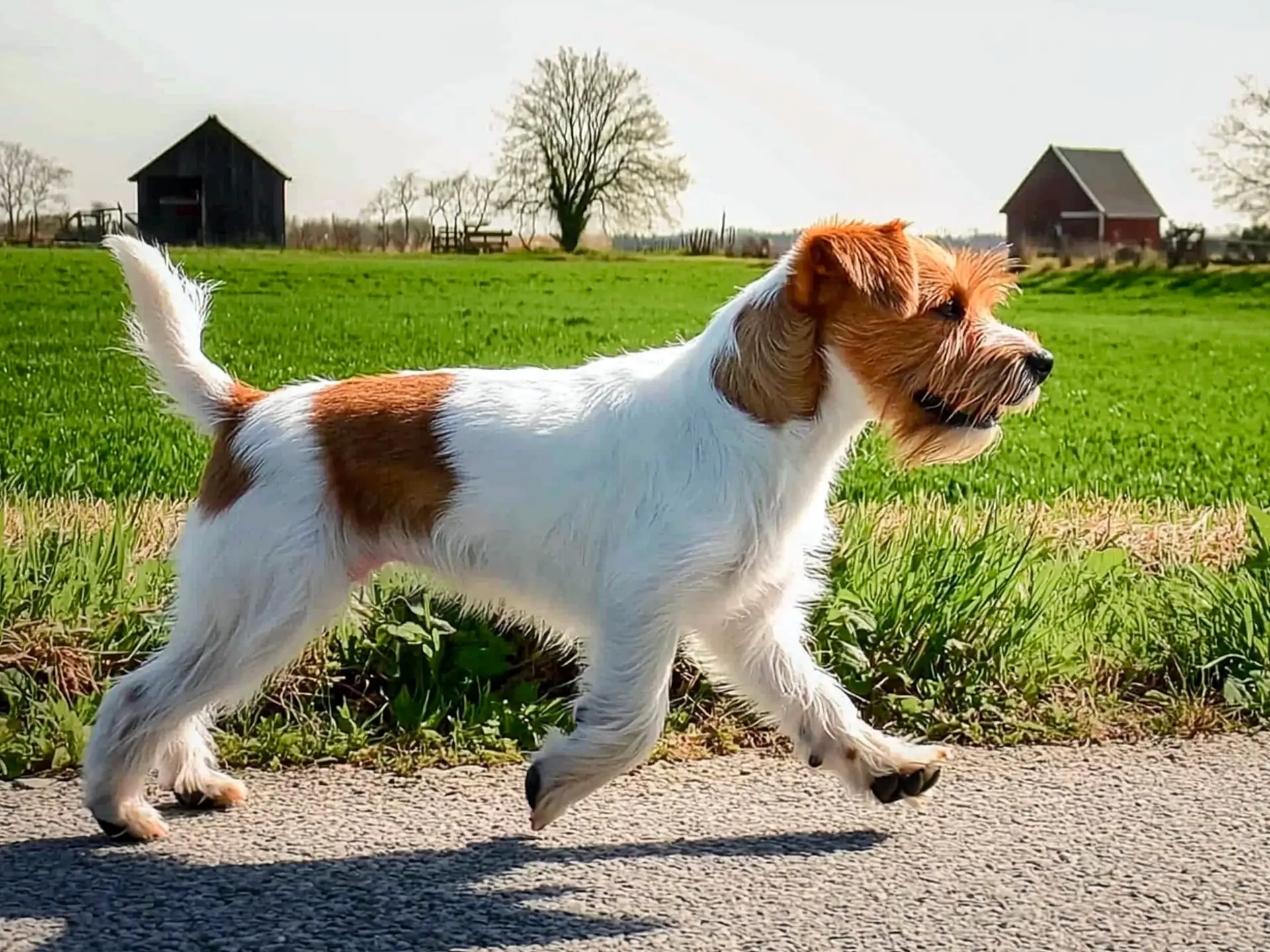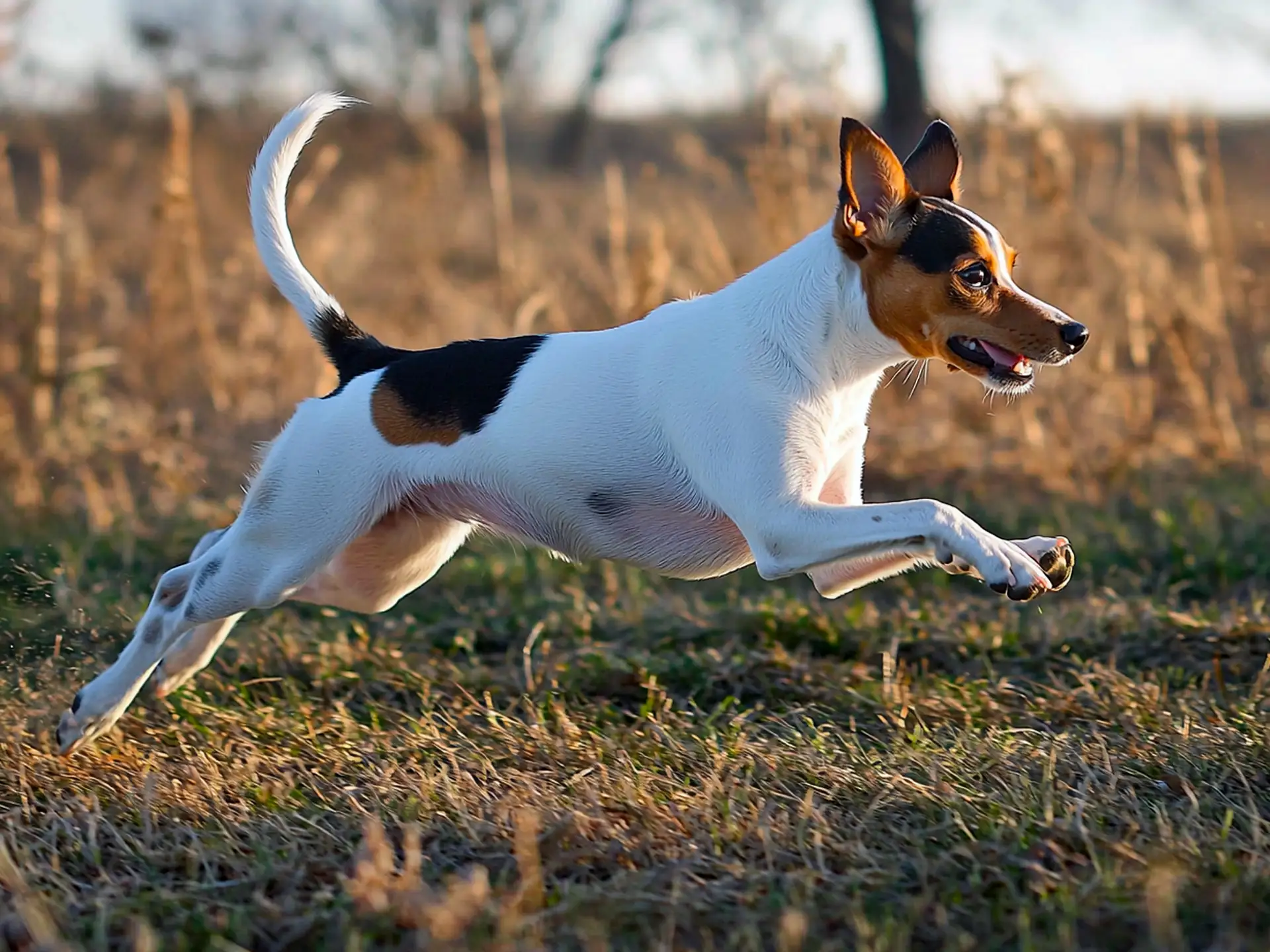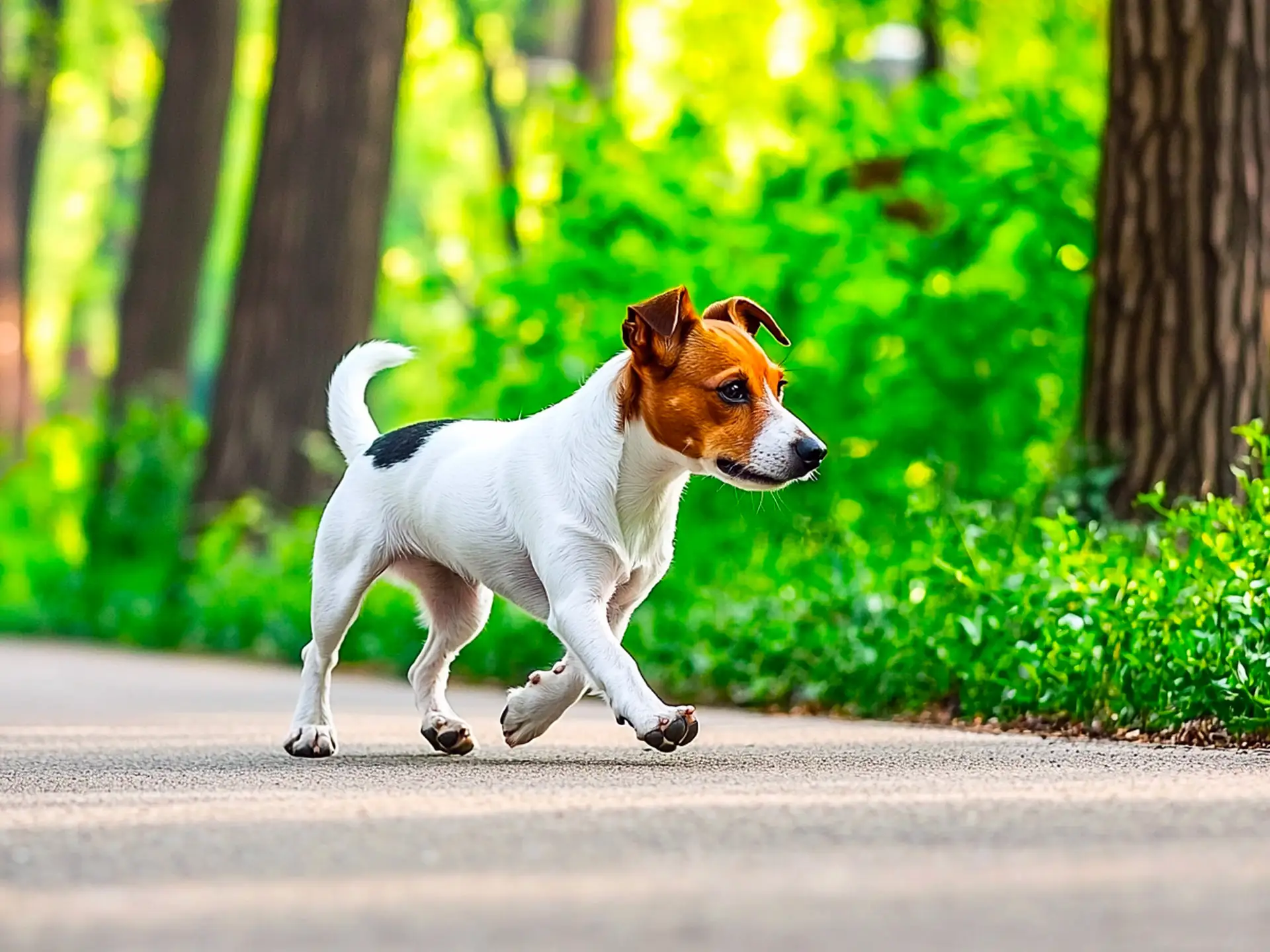Jack Russell Terrier Dog Breed Info & Overview
The Jack Russell Terrier, a small dog with a lively spirit, packs a big personality into its compact frame. Renowned for their boundless energy and sharp intelligence, these terriers are as charming as they are challenging. Originally bred for fox hunting, they have a strong prey drive and thrive on mental and physical activity. For active families or individuals, the Jack Russell Terrier is a loyal and spirited companion ready to steal your heart.
Characteristics
Pictures
Breed History
The Jack Russell Terrier originated in England during the 19th century, developed by Reverend John Russell. An avid fox hunter, he desired a dog that was athletic, courageous, and tenacious enough to chase foxes out of their dens. This breed was specifically crafted for hunting purposes, possessing the stamina and agility needed for long days in the field.
Over time, the Jack Russell Terrier’s popularity grew beyond hunting circles. Their intelligence and spirited nature made them favorites in various dog sports and even in film and television. Despite their small size, they were renowned for their big personalities and were often seen stealing the show with their antics and charm.
The breed’s name pays homage to its creator, John “Jack” Russell. Today, the Jack Russell Terrier remains true to its working roots, still used in hunting in some regions, but more commonly found as an energetic companion. Their history is rich with tales of adventure and showcases a lineage of determination and spirit.
Temperament, Personality
Jack Russell Terriers are known for their lively and exuberant personalities. They are intelligent and inquisitive, always ready for the next adventure. Their boldness and confidence can sometimes border on stubbornness, which makes early training and socialization crucial. They thrive on mental stimulation and can become bored if not adequately engaged.
With children, Jack Russells can be wonderful playmates due to their energy levels. However, their rambunctious nature means they might be too much for very young kids. They can be protective of their resources, so supervision is recommended. Their high prey drive can make living with smaller pets challenging, as they may see them as something to chase.
When it comes to strangers, Jack Russell Terriers are usually friendly but can be wary. Their alertness makes them good watchdogs, often quick to sound the alarm at unfamiliar noises. Proper socialization can help them become more accepting of new people and situations, making them well-rounded companions.
Physical Characteristics
The Jack Russell Terrier is a small but sturdy dog, typically standing between 10 to 15 inches at the shoulder. They have a compact, balanced build that reflects their agility and strength. Their body is slightly longer than tall, giving them the flexibility needed for navigating underground dens during hunts.
Their coat can come in three types: smooth, rough, or broken, all of which are dense and weather-resistant. The coloration is predominantly white with black or tan markings, which was originally preferred to distinguish them from the quarry during hunts. The Jack Russell Terrier’s expressive eyes and alert ears contribute to their intelligent and spirited appearance.
A distinctive feature of the breed is their strong, muscular jaws and a scissor bite. Their tails are typically carried high and may be docked in regions where this practice is still permitted. Overall, the physical traits of the Jack Russell Terrier are a testament to their working heritage and active lifestyle.
Health Issues
Jack Russell Terriers are generally a healthy breed but can be prone to certain genetic conditions. Common health issues include patellar luxation, where the kneecap can dislocate, and eye conditions such as lens luxation and glaucoma. Regular veterinary check-ups are essential to monitor and manage these potential problems.
Deafness is another condition that can affect the breed, particularly in predominantly white-coated individuals. It’s important to have puppies’ hearing tested early on. Additionally, some Jack Russells may develop Legg-Calvé-Perthes disease, a hip joint disorder. Keeping your dog at a healthy weight can reduce stress on the joints.
Preventive care includes maintaining a balanced diet, regular exercise, and routine health screenings. Dental hygiene is also important, as small breeds can be prone to dental issues. By staying proactive with their health, Jack Russell Terrier owners can help ensure their companions live long, happy lives. According to the Canine Health Information Center, participating in health screening programs can be beneficial.
Grooming Needs
Jack Russell Terriers have relatively low grooming needs, making them a manageable choice for many owners. Their dense, double-layered coat sheds moderately year-round, with heavier shedding during seasonal changes. Regular brushing once or twice a week can help minimize loose hair and keep their coat healthy.
For smooth-coated Jack Russells, a soft bristle brush or grooming mitt works well. Rough or broken-coated individuals may benefit from occasional hand-stripping to remove dead hair and maintain coat texture. Bathing should be done as needed, typically every few months, unless they get into something messy.
Don’t forget routine care such as nail trimming, ear cleaning, and dental hygiene. Their active lifestyle may naturally wear down nails, but it’s important to check regularly. Jack Russell Terriers appreciate the attention during grooming sessions, which also serves as an opportunity to check for any skin issues or parasites.
Exercise Requirements
The Jack Russell Terrier is a high-energy breed that requires ample daily exercise to stay content and prevent behavioral issues. At least one hour of vigorous activity is recommended, but more is even better. This can include walks, runs, play sessions, and mental stimulation through training and puzzle toys.
They excel in dog sports such as agility, flyball, and obedience competitions, which can provide both physical and mental challenges. Jack Russells love to dig and chase, so providing safe outlets for these natural behaviors can be beneficial. A securely fenced yard is essential, as they are known escape artists and can dig or jump surprisingly well.
Without sufficient exercise, Jack Russell Terriers may develop undesirable behaviors like excessive barking or destructive chewing. Keeping them engaged not only helps channel their energy positively but also strengthens the bond between dog and owner. Remember, a tired Jack Russell is a happy Jack Russell.
Training Tips
Training a Jack Russell Terrier can be both rewarding and challenging due to their intelligence and independent nature. They are quick learners but can also be stubborn. Consistency and positive reinforcement techniques work best, using treats, praise, and play as rewards for good behavior.
Early socialization is crucial to help them interact well with other dogs and people. Exposing them to different environments, sounds, and experiences can reduce the likelihood of fearfulness or aggression. Jack Russells have a strong prey drive, so leash training and reliable recall commands are essential for safety.
Mental stimulation is as important as physical exercise for this breed. Incorporating puzzle toys, obedience training, and even teaching tricks can keep their minds sharp. Patience and a sense of humor go a long way, as the Jack Russell Terrier’s spirited personality can make training sessions entertaining.
Nutrition, Diet
Feeding a Jack Russell Terrier requires attention to their high energy levels and metabolism. Typically, they need about 1.25 to 1.75 cups of high-quality dry dog food per day, divided into two meals. Choose a diet formulated for active small breeds to meet their nutritional needs and support their muscle development.
Due to their propensity for weight gain if overfed, it’s important to monitor calorie intake, especially with treats. Treats should not exceed 10% of their daily caloric intake. Jack Russells may also have sensitivities to certain ingredients, so selecting foods with easily digestible proteins and limited fillers can be beneficial.
Always provide fresh water and consult with your veterinarian to tailor a diet plan specific to your Jack Russell Terrier’s age, weight, and activity level. Puppies, adults, and seniors have different nutritional requirements, and adjustments may be necessary throughout their life stages to maintain optimal health.
Adoption, Breeders
If you’re considering adding a Jack Russell Terrier to your family, it’s important to choose a reputable breeder or consider adoption. Responsible breeders will provide health clearances and allow you to meet the puppy’s parents. They should be knowledgeable about the breed and ask you questions to ensure a good match.
Adoption is a wonderful option, as there are rescue organizations dedicated to Jack Russells. The Jack Russell Rescue CA is a great place to start. They work to rehome Jack Russells in need and can help match you with a dog that fits your lifestyle.
Whether adopting or purchasing, avoid puppy mills or pet stores where the dogs’ health and welfare are not prioritized. Doing thorough research and possibly connecting with the Jack Russell Terrier Club of America can help ensure you find a healthy and well-socialized Jack Russell Terrier.
Family Pet?
The Jack Russell Terrier can make a delightful family pet for the right household. Their playful and energetic nature aligns well with active families who can provide ample exercise and engagement. They often bond closely with their human companions and enjoy being part of family activities.
However, due to their high energy and sometimes assertive temperament, they may be better suited for families with older children who understand how to interact respectfully with pets. Supervision is important to ensure safe interactions, as Jack Russells may not tolerate rough handling.
Their strong prey drive can make cohabitation with smaller pets like cats, rabbits, or rodents challenging. Early socialization and careful introductions are key if other pets are in the home. Overall, with proper guidance and commitment, the Jack Russell Terrier can thrive in a family setting.
Right For You?
Before bringing a Jack Russell Terrier into your life, consider your ability to meet their exercise and mental stimulation needs. They are best suited for active individuals or families who have the time and energy to devote to training and play. If you’re looking for a couch potato, this breed may not be the best match.
They require a secure living environment, as their curiosity and hunting instincts can lead them to wander off in search of adventure. Apartment living is possible if adequate exercise is provided, but a home with a fenced yard is ideal. Jack Russells thrive when they have a job or purpose.
Ultimately, if you are prepared for the commitment and can appreciate their spirited nature, the Jack Russell Terrier can be a rewarding companion. Their intelligence and affection make them delightful for those who can keep up with their lively demeanor.
Conclusion
The Jack Russell Terrier is a small dog with a big heart and even bigger energy levels. They are best suited for active owners who can provide the physical exercise and mental challenges they crave. Their intelligence and affectionate nature make them wonderful companions, but they require commitment and understanding of their unique traits. If you’re ready for an energetic, loyal, and sometimes mischievous friend, the Jack Russell Terrier might just be the perfect addition to your life.
FAQs
-
How do Jack Russell Terriers handle long periods of downtime?
Jack Russell Terriers don’t handle extended downtime well due to their high energy levels and active minds. Without adequate stimulation, they may become destructive. Puzzle toys, interactive games, or tasks like nose work can help keep them occupied during quiet times.
-
Do Jack Russell Terriers excel in canine sports?
Yes, Jack Russell Terriers excel in sports like agility, flyball, and earthdog trials. Their intelligence, speed, and determination make them strong competitors. Participating in such activities not only fulfills their physical needs but also satisfies their desire for mental challenges.
-
Are Jack Russell Terriers escape artists?
Jack Russell Terriers are notorious escape artists. Their curious and adventurous nature drives them to dig under fences or climb out of enclosures. A secure yard with reinforced boundaries is essential to prevent wandering and ensure their safety.
-
How do Jack Russell Terriers interact with small pets?
Due to their hunting instincts, Jack Russell Terriers may not be ideal companions for small pets like rabbits or guinea pigs. Their prey drive can lead to chasing behaviors. Supervision and careful introductions are crucial if such animals are part of the household.
-
How do Jack Russell Terriers perform as travel companions?
Jack Russell Terriers can be excellent travel companions, provided they are well-trained and accustomed to car rides or public transportation. Their small size and adventurous nature make them suitable for trips, but regular breaks for exercise and bathroom needs are necessary.
Breed Ratings
The Jack Russell Terrier is highly intelligent and quick to learn, but may use their smarts to get into mischief if not properly engaged.
This breed loves to play and can provide endless entertainment with their antics. They thrive in environments where play is part of daily life.
With boundless energy, Jack Russells need plenty of exercise. They’re always ready for action and can keep up with the most active owners.
Moderate shedding requires regular grooming. Their short coat is relatively easy to maintain but does shed year-round.
A strong prey drive means they may chase small animals. Secure environments and leash training are essential to manage this instinct.
Their grooming needs are minimal, with regular brushing sufficing. Occasional baths and routine care keep them looking their best.
Intelligent but sometimes stubborn, they require consistent and patient training methods. Positive reinforcement works best.
Jack Russells prefer company and may develop separation anxiety if left alone too long. They do best with attentive owners.
They are vocal and will bark to alert or express excitement. Training can help manage excessive barking.
Low drooling tendency makes them relatively tidy around the house. You won’t need to keep a towel handy.
With proper socialization, they can get along with other dogs, but may be territorial or assertive, especially with same-sex dogs.
Generally healthy with a lifespan of 13–16 years. Regular vet check-ups help maintain their well-being.

